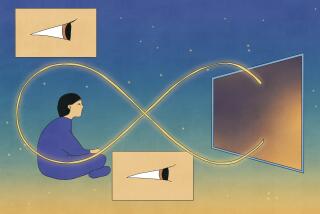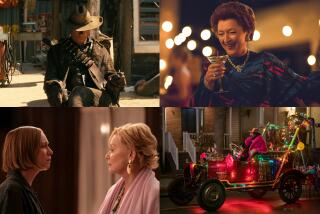‘Alphas” Bruce Miller on the challenges of running a TV show
Veteran TV producer Bruce Miller has written for “ER,” “Medium” and most recently served as the co-show runner for the SyFy series “Eureka.” He’s now the sole show runner for SyFy’s “Alphas” about a group of people with superhuman abilities. The second season premieres Monday.
Before “Eureka” had you ever run a show before?
No, I’d been a second in command before that. I had worked on lots of shows. I had seen how lots of different show runners ran their shows. I had some really great examples, including Jenny Bicks on “Men in Trees” and John Wells on “ER.” It was great to see those different styles of running a show. Luckily, I was fired from all those jobs.
How did you come to be the show runner of ‘Alphas’ in its second season?
I had been a big fan of “Alphas,” and being on a network that’s a relatively small family of shows, I had known the people on “Alphas.” I had followed them closely when they were in development and I had watched just as a fan in the first season. After the first season, completely independent of me -- and I don’t know why they make these decisions -- they were making some changes in who they wanted on the show and they asked me if I was interested in coming in and running it. It’s not often you get asked by a show you like. It was such a great pleasure. Here’s this astonishing cast, a really fun world and fun stories. And the first season of a show is incredibly rocky, getting that big machine up and running. Figuring out what hair looks good on which actors and how long your scripts have to be. It’s a big process. So coming in on the second year, it’s nice some of those kinks have been worked out.
Did you have to pitch your vision for the show before they gave you the job?
There are a lot of people here who were here last year, so there’s a lot of continuity in story and intention of story and how the world is going to keep moving. Really, I had casual conversations with the network about the show, how I liked the show, what I wanted to see on the show, that really didn’t have anything to do with me being involved. So they already knew my take on the show and where I thought it should go. You want to have an idea of what you want to do and what you like about the show and don’t like about the show. But also you wait to get your creative team and don’t say, “This is where we’re going” but say to them “What do you think is cool about the show, what do you think is cool to see?” So we started the year with a retreat. It’s something I took from John Wells on “ER.” We went away and had three or four days of meetings where we sat and talked about character. You talk about the character of, say, Doctor Rosen (David Strathairn). What you like about him, what you don’t like about him. What you’d love to see him do, what are you favorite things he’s done this year. You get down to what kind of food do you think he likes, and those kinds of things. Out of those conversations comes, if he’s in this place in his life and what would really knock him back on his heels and really change his life quite a bit. That’s why we’re focused very much on his daughter, who’s mentioned in the finale of last year and how fascinating that relationship was. And the writers from last year and the new writers we brought in this year who had all watched the show were all excited by that relationship and so you say “OK, what’s interesting about these characters?” and go from there. So there is a bit of me having ideas and being excited about things and having a plan. But what you want to do is bring the team together so you can have a better plan. You want to be playing chess, not Candyland.
Stanton Parrish seems to be the show’s major villain, but it’s surprising how little he’s been seen on camera.
John Pyper-Ferguson, who plays Stanton Parrish, is a great actor and a terrific guy. It’s difficult to be in one or two scenes in an episode. You have a tendency to feel like your character is adrift. But we’ve had so many conversations and tried to talk it through. I certainly had a sense of how that character was going to go throughout the season. We talked about the whole season. And he did say to me, he gets to do the most amazing stuff on our show and yet he’s only in one or two scenes. On the one hand, you’re disappointed, on the other hand, you’re like, “Wow, that’s the scene I get?” We have episodes upcoming where you see him in the Civil War. We somehow fooled the network into letting us shoot a whole bunch of stuff that happens in the Civil War. We went big.
What are your other duties as show runner besides the writing?
As show runner, you are responsible for the entire show. Even though it’s a group effort, every script is a group effort, you are responsible for guaranteeing the quality of everything that comes out. So from script to every casting choice, to every costume choice, to every hair choice to every makeup choice and every effect. And then the final cut you give to the network and then the revisions of those cuts. Knowing that they are my responsibility we have incredible people working here who do those jobs exceptionally well and I think the biggest part of my responsibility is hiring the people who do those jobs exceptionally well. I’m final approval on the stories, final rewrite on the scripts, final decision on department heads, final decision on the little things that go into an episode from props to set dressing to what kind of car people drive to all the editing choices and the color correction to make sure the actresses don’t look green. Last night, I was at the final mix of an episode, which was the last time you go through it. You see everything put together and all you’re doing is tweaking the final bits of sound. I was there for four or five hours going through it. Now I sound very tired.
As a writer, you know story and dialogue, but do you have equally strong feelings about whether a character should wear a red shirt or blue shirt?
As with all creative stuff, if you do your job well you move up and all of a sudden the bulk of your job has very little to do with what got you that job. I have the management responsibilities, the financial responsibilities, the political responsibilities. Those are not places I excelled apparently to get this job. I’ve had to learn a lot. Especially about managing creative people and making them feel they can do their best work and making them feel that they’re not under more pressure than they need to be. But in terms of your question, it all comes from character. That’s what I tell everybody on set. If you ever get yourself into a position where you don’t know what to do, think about the character. The real choice they would make in that story. When you choose between a red shirt and a blue shirt, what I’m thinking is, did that person wake up in the morning and know what they were going to do that day? So they chose one of those shirts. Now if they thought they were going to be in the office, they would wear different shoes than if they thought they were gong to be in the woods running around. If they’re in the woods running around and they’re wearing really good shoes for the woods, you’re thinking did they know they were going to be there? For example red shirt or blue shirt. If they wore the red shirt in another episode, they should wear the red shirt again because then you as an audience member imagine they have a closet and they only have X number of shirts like I do. They have favorite shirts. That also doesn’t mean they don’t have an infinite amount of money, which makes them more real and more relatable. If you have a red shirt and a blue shirt and it doesn’t matter, you think, “What looks good on that person?” and also, is someone else in that scene with the same color hair wearing a red shirt? Will everyone be able to tell the difference between these people?
There’s a major new character on ‘Alphas’ this season?
Erin Way plays a character named Kat who has no last name as of yet. Her character is an Alpha. Like any of them, their abilities come with upsides and downsides. She’s a quick study. She can learn tae kwan do, karate, kickboxing, just by watching. She watches three or four TVs at a time and she reads and can absorb all of that information instantly. It has to do with her muscle memory. Whereas it would take you or I repetition to be able to do those things, she gets it immediately. She also has quite a downside. She doesn’t remember anything that happened beyond five or six weeks ago. So her short-term memory is astonishing and her long-term memory is nonexistent. She doesn’t know where she’s from, she doesn’t know where she was, she doesn’t know her parents. She has no memories beyond a few weeks ago. She has a bracelet that says Kat and that’s who she is. The other cool thing is that once she learns something, she learns it forever. Once she forgets, the stuff doesn’t go away. So if you were going down in a helicopter and you said, “Do you know how to fly a helicopter?” She’d say “I don’t know, let me see.” And if she jumped into the seat and grabbed the controls, she may very well be able to fly it. She doesn’t know what she knows.
It seems like the scale of the show has grown in the second season. How much does your budget dictate that scale?
There is a budgetary restraint always. But we have amazing effects people who can find ways to do anything we can come up with. It’s much more a question of what feels like our show. This season has a lot of scale and scope. We tried to make it feel like it was happening on a level that considered the amount of global reach information has these days. This year, we’re going to have things happening in China, in 1967, in the Civil War, the vastness of space time and the concept is very, very big this year. The canvas we’re painting on is very big, but we’re still coming back to character relationships. Our effects people do astonishing things.
You’re based in L.A. but the show shoots in Toronto. Are you back and forth all the time?
I try to go up as much as possible. It’s genuinely difficult. When you’re there you feel like you can answer questions and have conversations because when you come down to it, a lot of what we do is about the minutiae of how you say a certain word. Or a look across a room could change the entire story arc for the year. So you want to be there to discuss the subtleties of the scenes. We have ways of doing it via the telephone. The writer for the episode is there. We have a remarkably communicative cast. They ask us questions, they prepare ahead of time. They know as much as we can tell them. It’s not that we don’t know, but sometimes things change and you don’t want to say, “Three episodes from now you’re going to the moon!” and then you realize we can’t afford to send them to the moon. It’s a bit like driving the Mars Rover. You do something and then 20 minutes later, the Rover moves. So you have to be thinking quite a distance ahead.
ALSO:
‘American Idol’ enters crisis mode
‘The Real L Word’ takes on a life of its own
‘Breaking Bad’ Season 5 premiere is most watched episode to date
Join Patrick Kevin Day on Google+ or Twitter. Email: patrick.day@latimes.com
PHOTOS, VIDEO AND MORE:
PHOTOS: Behind the scenes and the Emmys Round Table
PHOTOS: Celebrity photos by the Times
VIDEO: Watch the latest fall TV trailers here
More to Read
The complete guide to home viewing
Get Screen Gab for everything about the TV shows and streaming movies everyone’s talking about.
You may occasionally receive promotional content from the Los Angeles Times.







